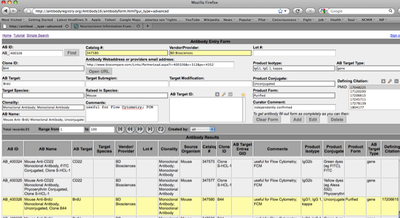An antibody registry for biological sciences
Anita Bandrowski (UCSD), Vadim Astakhov (UCSD), Jeff Grethe (UCSD), Maryann Martone (UCSD)
The neuroscience information framework (NIF) as part of its mission to make scientific resources more ‘discoverable’ undertook the aggregation of antibody data under one common data model, and one ontological framework, which we called the antibody registry. We have negotiated agreements for more than 890,000 commercially available antibodies including a unique identifier for each antibody that, we propose, should be included in any new publication of antibodies. The information includes the vendor, catalog number, clone id, antibody target, target subregion (where available), target modification, target species, raised in species, target Entrez id, clonality, name and comments. The data model was aligned with the model created by the Eagle-I project and the IEDB project (Immune Epitope Database), both tasked with cataloging non-commercial antibodies. In the near future, the data from both projects should be represented within the antibody registry. In addition we have created a web-accessible graphical interface, written in JAVA, which would serve as a search and registration tool for any scientist to search for and add antibodies. The system is deployed at: http://antibodyregistry.org
To test our the extent of our holdings, we compared antibodies listed in the Journal of Comparative Neurology (JCN) database, and we found that the registry listed full information for 74% of the ~5000 antibodies in the JCN database and the missing subset is being added to the registry. To highlight antibodies heavily used by researchers we have created a “verified” tag for antibodies generated and rigorously tested by large projects such as NeuroMab at UC Davis, and added over 4000 JCN publications associated with individual antibodies.
The data are now in use by the NIF search engine as well as the SWAN annotator service. With this extensive database, covering most commercial antibodies, and easy to use registration tools scientists should be able to disambiguate antibodies within papers, and tag the literature more robustly so that any text mining software, or researcher can find it.


 Latest news for Neuroinformatics 2011
Latest news for Neuroinformatics 2011 Follow INCF on Twitter
Follow INCF on Twitter
